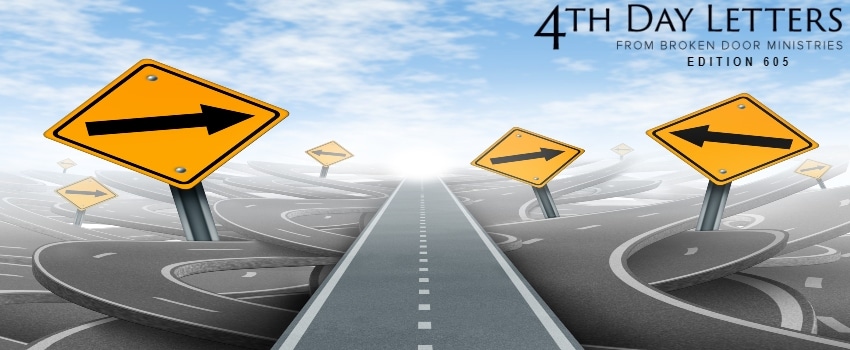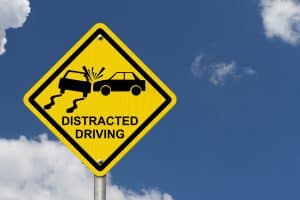
Dangerous Distractions
Podcast: Play in new window | Download
Subscribe: Apple Podcasts | RSS
It was a Sunday afternoon. An experienced and cautious cyclist out on a relaxing ride, was suddenly hit by a driver talking on a cell phone. She was thrown over 200 feet and killed on impact. The driver, an otherwise upstanding citizen, was charged and convicted with vehicular homicide. Distractions are a serious problem that impact nearly every aspect of life, including our spiritual lives. How are distractions impacting you? Please read more.
 All drivers must contend with visual, manual, and cognitive distractions. In 2019, over 3,100 people were killed and about 424,000 were injured in crashes involving distracted drivers. About 1 in 5 of the people were not even in the vehicle. They were walking, riding their bikes, or doing something else near the road. Research points to the inherent dangers associated with texting, talking on a cell phone, using a navigation system, changing radio stations, and even eating while driving.
All drivers must contend with visual, manual, and cognitive distractions. In 2019, over 3,100 people were killed and about 424,000 were injured in crashes involving distracted drivers. About 1 in 5 of the people were not even in the vehicle. They were walking, riding their bikes, or doing something else near the road. Research points to the inherent dangers associated with texting, talking on a cell phone, using a navigation system, changing radio stations, and even eating while driving.
Driving is not the only time we get distracted. We get distracted in many ways. Look around and you will find unfinished projects, half read books, unplanned vacations, un-listened to podcasts, and a myriad of other examples in your own life, that demonstrate that your focus was pulled away from one project to do something else.
The dictionary defines distracted as: unable to concentrate because one’s mind is preoccupied. It defines distractedness as: a state of being distracted. Are we living in a permanent state of distractedness?
 Let’s face it, multi-tasking is challenging and in the wrong circumstance, dangerous. Interestingly enough, current cognitive research shows that our brains have limited capacity for dual tasking. Our computers slow down when trying to perform too many tasks at one time. So to, our brain performs tasks slower when multi-tasking. Multi-tasking also slows down our reaction time. When we combine being distracted with fatigue, it exponentially increases the dangers.
Let’s face it, multi-tasking is challenging and in the wrong circumstance, dangerous. Interestingly enough, current cognitive research shows that our brains have limited capacity for dual tasking. Our computers slow down when trying to perform too many tasks at one time. So to, our brain performs tasks slower when multi-tasking. Multi-tasking also slows down our reaction time. When we combine being distracted with fatigue, it exponentially increases the dangers.
Social media, cell phone games, and technology in general compete for our attention, as do so many other things. As we become more conditioned to living in a world of distractions, our ability to listen, think carefully, be still, meditate, and pray are all negatively impacted. This clearly points to the spiritual danger of distractedness.
One article I read said, “the average person’s mind wanders 47 percent of the time, according to a 2010 Harvard study, so nearly half the time you’re doing one thing, you’re thinking about something else.” I think most of us experience this in our prayer life.
 Brain science reveals that certain emotional states of mind increase our distractedness. The BLASTed emotions of life (Bored, Lonely, Angry, Stressed, Tired) can distract Christians, drawing them away from God, and cause them to seek out other forms of worldly pleasure such as alcohol, drugs, sex, or gambling.
Brain science reveals that certain emotional states of mind increase our distractedness. The BLASTed emotions of life (Bored, Lonely, Angry, Stressed, Tired) can distract Christians, drawing them away from God, and cause them to seek out other forms of worldly pleasure such as alcohol, drugs, sex, or gambling.
How many times have you sat in church and had so many thoughts in your head that you’ve forgotten the homily by the time it’s over? How many times have you tried to pray and been distracted by a million other thoughts?
In our hyper-distracted world, we need to learn once again to quiet our minds. We need to stop trying to do everything at once. We need to develop mindfulness skills. We need to become present in the moment, rather than anticipating a hundred other events in our future. And, we need to make space in our thoughts for the Holy Spirit to speak to us.
 Romans 12:2 states, “Do not conform yourselves to this age but be transformed by the renewal of your mind, that you may discern what is the will of God, what is good and pleasing and perfect.” So how can we transform and renew our minds? This might seem like an odd thing to say, but there are ways to distract us from our distractedness. Science has shown us proven methods to calm our brains, slow us down and increase our focus. These include watching inspiring shows, listening to inspirational podcasts, walking in nature, exercising, singing, laughing, playing with children, meditating, and making time for silence in our life.
Romans 12:2 states, “Do not conform yourselves to this age but be transformed by the renewal of your mind, that you may discern what is the will of God, what is good and pleasing and perfect.” So how can we transform and renew our minds? This might seem like an odd thing to say, but there are ways to distract us from our distractedness. Science has shown us proven methods to calm our brains, slow us down and increase our focus. These include watching inspiring shows, listening to inspirational podcasts, walking in nature, exercising, singing, laughing, playing with children, meditating, and making time for silence in our life.
In our opening story, distractedness ended the life of the cyclist and destroyed the life of the driver. We must be careful to never allow distractedness to end or destroy our relationship with God. In conclusion, let’s all ask ourselves the following questions:
- What distracts me from reading Scripture?
- What distracts me from my prayer time?
- What distracts me from quality time with my family and friends?
- What distracts me from being present to my spouse?
- What distracts me from loving more deeply?
- What distracts me from feeding the hungry or giving a drink to someone who is thirsty?
- What distracts me from clothing the naked or providing shelter to someone who is homeless?
- What distracts me from visiting those in prison?
- What distracts me from comforting the sick and dying?
- What most distracts me from a closer relationship with God?
 Once we identify the cause of our distractions, we should ask God for His help and guidance to remove these things from our life.
Once we identify the cause of our distractions, we should ask God for His help and guidance to remove these things from our life.
Heavenly Father, please calm my mind and remove the distractions that keep from doing your will, prevent me from hearing your voice, and interfere with the close relationship I seek to have with you. In Jesus’ name I pray. Amen.
AMDG
As always, I love to hear from you. You can email by clicking here. To share your thoughts with other readers, please use the comment section below.
Please take a couple minutes to watch the video about my new book. The book is available on this website and on Amazon.com. It is also NOW AVAILABLE IN SPANISH. Please be sure to like the video and to leave a review of the book on Amazon after you have read it. Thank you!
- What Is The Church’s Role In Society? - July 21, 2024
- The Thorn Remained - July 14, 2024
- The Confounding Nature Of Freedom - July 7, 2024

Brian
A late response , distracted
Great message.
Be still & know that I am God comes to mind Inner stillness something I work at.
God bless.
Michael
I was going to comment yesterday, but – something came up 🙂
Joe
Thank you for so succinctly remaking the point. That’s exactly the way distractions work!
Brian
Brian, this is so true for me! I have often said I have Adult ADD😂
Steve
I have that too!
Brian
Amen to your post.
Father, help us to keep our eyes on Jesus, the author and perfector of our faith. Help us Holy Spirit and guide us on your path that leads to life. In Jesus name amen.
Thank you Brian for the reminder to recenter my priorities and keep my eyes on Jesus.
Violet
Thank you for your post and for your prayer. I hope you have a blessed day.
Brian
Thank you, Brian, I need this message today!
Floyd
Thanks for your post my dear friend. Let’s all give thanks to the Holy Spirit. I think he wanted to remind us all how easily we can get distracted. Have a blessed day.
Brian
Brian, all of your fourth day letters are great. This one is a home run!
KC
Thank you! Have a blessed day!
Brian